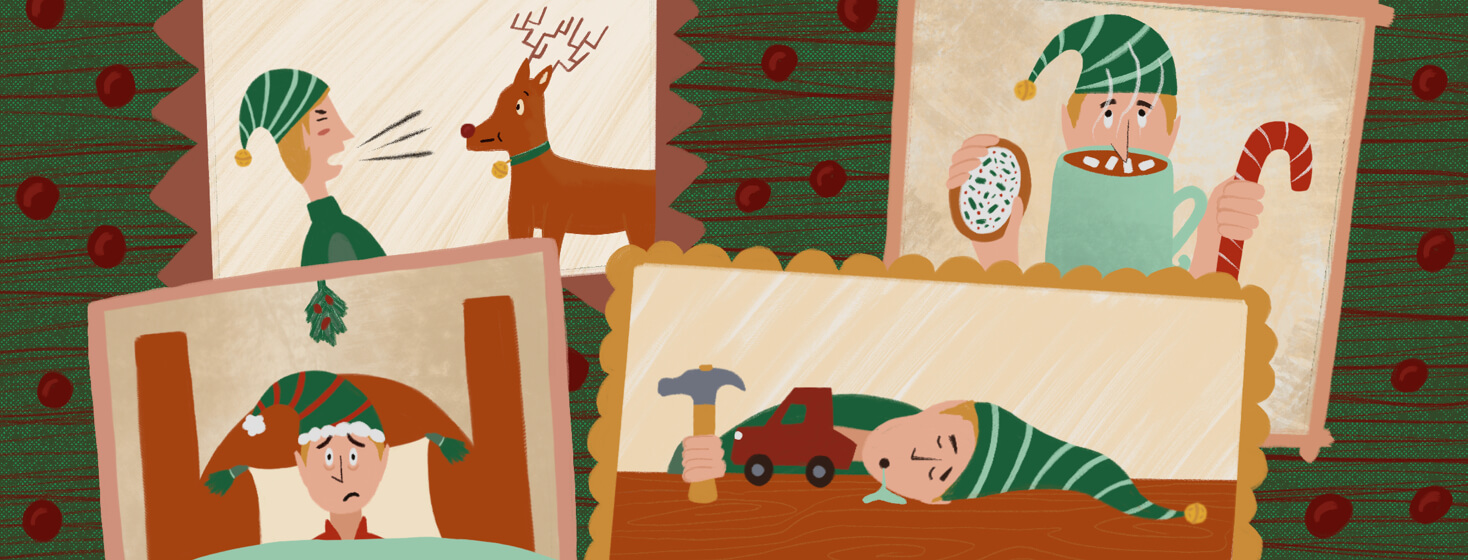Is Adequate Sleep During the Holidays Possible?
Who doesn't lose a little sleep between Thanksgiving and New Year's Day?
These are times of social gatherings, celebrations of faith, and merriment. Sounds lovely, right? But even these pleasant aspects of the holidays generate stress.
The result? Acute (short-term) insomnia and daytime sleepiness.
However, with self-awareness and attention paid to common sleep problems, you can still get adequate sleep to survive the holidays.
Sleep matters during the holidays
Insomnia can wreak havoc on daily life, especially at a busy time like the holiday season. Why? Lack of sleep can severely and adversely affect your health in many ways:1,2
- You’re sleepy during the day, making it hard to work or study.
- Daytime sleepiness makes it dangerous to drive or work safely with equipment.
- Problems with focus and concentration can make simple tasks harder.
- Sleep loss can make you irritable, aggressive, even impulsive, putting relationships into conflict.
- If you don’t conquer acute insomnia, you may develop chronic insomnia, putting yourself at risk for other chronic illness.
Mental health considerations
Anxiety
Short-term (acute) insomnia often arrives as anxiety at bedtime. Maybe it's worries about the holiday price tag — not only the gifts and goodies, but the cost of heating, warm clothes, and travel. It could be the busy calendar — parties, shopping excursions, and outdoor sports, though fun, can cost you the sleep you need. Traveling, especially during inclement weather, also creates anxiety. And if you're crossing multiple time zones, you'll face jet lag. While temporary, it can cause sleeplessness.
Depression
Many people don't have positive relationships with the holidays. Depression is common at this time of year, often linked to darker days and longer nights.3
Others grieve losses at the holidays. Meanwhile, those living alone may not have adequate support from social groups to prevent feelings of loneliness at this time of year.4,5
Substance use and abuse
Partaking in holiday "cheer" by way of alcohol, marijuana, or other substances is a traditional way some celebrate the season. Far too often, though, substance use masks something else: a need for comfort, pain relief, or to manage anxiety.
One serious sleep-stealing outcome of holiday “cheer” is substance use disorder, which peaks at the holidays and can further disrupt sleep.6
Physical health considerations
Diet
We all face changes in eating habits during the holidays. It's common to consume more calories than usual, and everyone has a vice: sugar, fat, salt, caffeine, fried foods, etc.7
Parties and holiday feasts make it hard not to eat delicious food when it's so close at hand. Busy schedules leave us reaching for fast food, junk food, and carry-out to save time.
Sleep lost to social events or household obligations can, unfortunately, set into motion biological processes that can increase your appetite and make it harder to feel full.8
This or That
Do holidays trigger your insomnia?
Sedentary living
Not only do we eat more during the holidays, but we're also more likely to move less.9
We can blame cold weather, storms, darkness, closed gyms, and the seemingly endless list of tasks, errands, and chores related to the holidays for not getting enough exercise. Still, our bodies need regular exercise — especially during the light of day — to encourage a strong sleep drive. This supports strong circadian rhythms, which greatly influence how much and how well we sleep at night.
Making sleep matter during the holidays
Sleep 'CLEAN' with sleep hygiene
Sleep hygiene describes habits and rituals done to achieve sleep at bedtime. These include relaxation practices, quiet activities, and nightly rituals. The holidays easily disrupt good sleep hygiene. Sticking to a sleep schedule is one way to practice "clean" sleep hygiene during the holidays.
Beware of screens
The blue spectrum light emitted from electronic devices (smartphones, tablets, computer screens, handheld video games, etc.) shuts down efforts by the brain's pineal gland to release natural melatonin in preparation for sleep. To avoid this, you can set aside backlit devices at least an hour before bedtime, use filters on your devices to block blue light, or wear blue-blocking glasses while using these devices.
Self-care isn't selfish
Checking in with yourself during the days — and nights — during the holidays can help you identify reasons for struggling with sleep. Be cognizant of what — and how much — you're eating. Invent easy ways to build more physical activity into your days. Address moments when you notice feeling anxious or depressed.
Your awareness of stress triggers can inspire proactive behaviors. Meditation, relaxation, or soothing bedtime rituals can help reduce your chances of yet another sleepless night.
The bottom line
Insomnia, whether acute or chronic, seasonal or perpetual, robs us of quality of life.
Solving sleeplessness during the holidays may require an intentional effort on your part. But it's worth it if you want to improve your mood and give yourself the energy you need to endure — even enjoy! — the weeks of celebration ahead.

Join the conversation